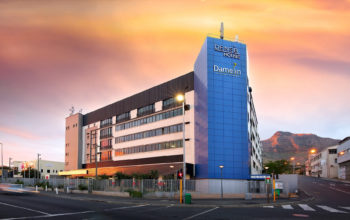By Staff Reporter
news@alexreporter.co.za
Two South African learners have been awarded the opportunity to showcase their scientific brilliance at the 2023 Taiwan International Science Fair, after impressing at the Eskom Expo for Young Scientists International Science Fair (ISF) with their research projects.
Dia Singh, a Grade 12 learner at St Dominic’s School in Newcastle, KwaZulu-Natal and Jaco Jacobs, a Grade 12 learner at Outeniqua High School in George, in the Western Cape will participate in the Taiwan fair which takes place from 6 to 10 February 2023 at the National Taiwan Science Education Center in Taipei.
South Africa participates in this fair annually as it offers learners an opportunity to present their research to their peers from other countries, while promoting cross-cultural communication and educational exchange.
With the research project, “Using P.I.P. to strengthen roads: Plastic incinerated by plastic”, Singh – who was awarded a gold medal at ISF – demonstrated that the fuel produced when plastic is burnt can be used to burn more plastic waste.

In this way, one can get rid of plastic using an alternative fuel source. She concluded that the temperature and time taken by plastic fuel to burn more plastic correlates positively with that of coal and natural gas.
It produced a similar amount of plastic fuel as these conventional fuel sources. In addition, Singh developed the Plasticator mobile application, which allows for the monitoring of quantities and types of waste that have been incinerated.
This data is then saved onto a database and can be used for analysis purposes.
The research project by Jacobs, ‘Automated Inflation and Pressure Regulation for Recreational and Professional Cyclists’, found that for competitive cyclists, as well as amateurs, deflated or over-inflated tyres has always been problematic and more importantly, a safety hazard.
The learner’s fourth prototype 3D-printed design automatically adjusts the tyre pressure while moving. Using an air release valve that is designed to work with a servo motor, the prototype has a mountable housing for the electronics.
Jacobs, who was awarded a gold medal at ISF, wrote the code that enables the device to manage incoming data such as low pressure and adjust the tyre pressure accordingly.

He now has a fifth prototype with a higher capacity and has also found a creative and more efficient way to house the device on the cycle. Using this prototype, cyclists can also adjust the tyre pressure as the terrain of the track they are using changes.
Eskom Development Foundation Chief Executive Officer, Sumaya Nassiep, said: “Having witnessed the innovations of the two learners at the Eskom Expo International Science Fair this past December, it is vital to have our homegrown talent compete in international science fairs such as the upcoming Taiwan Science Fair, where they are able to interact with like-minded peers who are knowledgeable and skilled in engineering and innovation.
“This is to create awareness of the global youth innovation space and its trends, as well as to encourage networking and collaborations at an international level.
“As the funder of Eskom Expo for Young Scientists, our continued investment in the Expo is an important way to promote scientific education and interests in future careers in science, technology, engineering, mathematics and innovation (STEMI).”
Nthato Minyuku, Eskom Group Executive: Government and Regulatory Affairs, said: “Cultivating the next wave of innovators is an investment for our country.
“With their research projects, the two learners will present novel solutions, complex engineering challenges and scientific research that resonate globally.
“We are truly proud to be part of creating a pipeline of innovators by means of the Eskom Expo for Young Scientists, our contribution to building technology, science and engineering talent in the country.”



